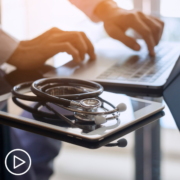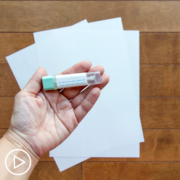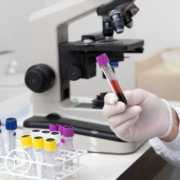Three Key Steps for Newly Diagnosed Follicular Lymphoma Patients
Three Key Steps for Newly Diagnosed Follicular Lymphoma Patients from Patient Empowerment Network on Vimeo.
Once a patient has been diagnosed with follicular lymphoma, what’s next? Lymphoma expert Dr. Matthew Matasar shares his expert advice on key next steps for newly diagnosed patients.
Dr. Matthew Matasar is a lymphoma expert at Memorial Sloan Kettering Cancer Center and Chief of Medical Oncology at Memorial Sloan Kettering Bergen. To learn more about Dr. Matasar, visit here.
See More from The Pro-Active Follicular Lymphoma Patient Toolkit
Related Programs:

Why Should Follicular Lymphoma Patients Seek a Second Opinion? |

What Factors Are Considered When Choosing a Follicular Lymphoma Treatment? |

|
Transcript:
Katherine Banwell:
What three key pieces of advice would you have for a patient who has just been diagnosed with follicular lymphoma?
Dr. Matasar:
The first thing I would say is that everybody should have access to a second opinion pathology review.
This is independent of what the doctors are giving you advice in taking care of the illness, but just making sure that the diagnosis itself is correct. We know that the diagnosis of lymphoma is a tricky one for pathologists, particularly if they’re not pathologists that are seeing lymphoma under the microscope every day of the week. And when you go for a second opinion pathology review by having the slides sent to a major academic center, there’s a possibility that the diagnosis will be changed or revised in a way that’s meaningful meaning that it would lead to different recommendations for how to take care of your illness.
The second is that you’re entitled to a second opinion medical review as well and going to see an expert in lymphoma if your first opinion was with a community oncologist or somebody referred by your primary care doctor who may not have singular expertise in these illnesses, can be helpful. It can be reassuring if that doctor says, “You know what? I agree with your local oncologist, and I’m happy to collaborate with their care.”
Or they may say, “You know, we have a different perspective. There’s newer data. There’s newer options. There’s clinical trials. There’s other resources to bring to bear,” and maybe your choices are broader than you may have originally believed.
And the third is just to be that advocate for yourself, to take charge, and to participate in your care. Let your doctors know who you are, how you view things, how you like to receive your healthcare information. Are you a big picture or a detail person, and what are your priorities so that they can best match their recommendations to who you are as an individual, as a person, as a member of a family in the community so that they can give you the most personalized and appropriate recommendations possible.
Katherine Banwell:
Why should patients consider seeing a follicular lymphoma specialist?
Dr. Matasar:
I think that it’s increasingly important when you’re looking at a diagnosis of follicular lymphoma to consider seeking an expert second opinion from a lymphoma specialist. And this is because our understanding of this disease is changing very rapidly. The therapeutic armamentarium is changing very rapidly with new treatments becoming available every year. And sometimes a community oncologist who is required to be expert in many different diseases may not have access to the same body of information or the same insights that somebody who specializes in this disease may have at their fingertips.










